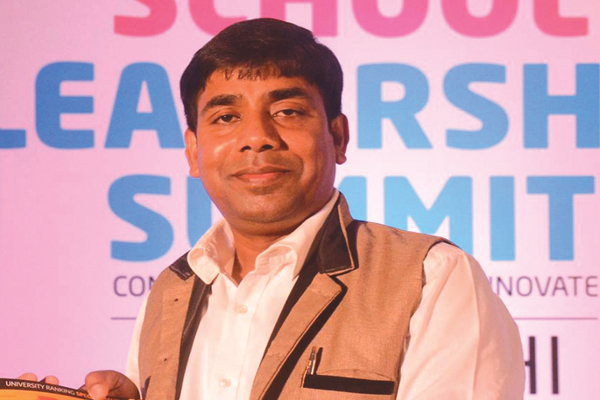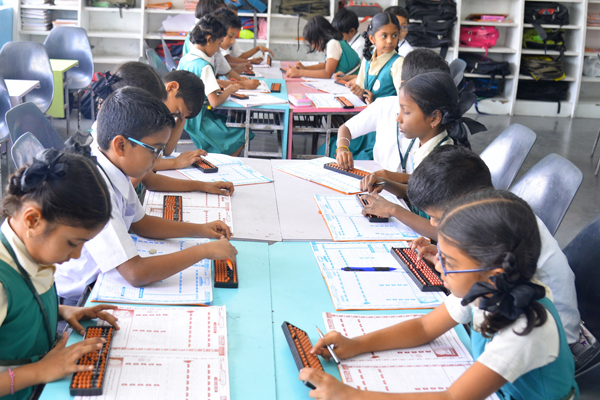
The main objective of the Central Board of Secondary Education (CBSE) is to serve the educational institutions effectively and to be responsive to the educational needs of those students, says Dr Biswajit Saha, Director (Training & Skill Education), CBSE, in an interview with Elets News Network (ENN).
In line with Government’s vision of skilling the Indian youth, what initiatives have been undertaken by the CBSE?
The CBSE has tried to include various skill-oriented subjects in its curriculum both at secondary and senior secondary level. In class ninth and tenth, we are offering 17 skill-oriented courses catering to the requirements of all sectors. Similarly at Senior Secondary level, CBSE is offering 43 courses ranging from Artificial Intelligence to early childhood education, yoga, retail, tourism, media etc. We have tried to cover all the areas such as engineering, healthcare, banking and finance along with others through these courses. Out of 21,000 schools affiliated to CBSE, 8,000 schools are imparting skill-oriented education and training with enrollment of around seven lakh students so far.
It is also important that higher education sector must encourage the skill training among its students as there are still visible gaps between Industry and Academia despite the efforts of Union and State Government. Government is also aiming to develop the schools as Skill Development Centres as their excellent infrastructure is underutilised after two pm. It will boost the skill training, community service and social empowerment. Such training will also support in nurturing globally competitive citizens who will be ready to work in any country of the world. Ultimately the quality education and effective skill training help in India’s economic development.
With New Education Policy (NEP) likely to release in few months, how is CBSE improving its guidelines to be in line with the needs of two most important stakeholders i.e. teachers and students?
The New Education Policy is still at draft stage. There are so many components in it that are really encouraging but at the same time we are also raising our concerns about school education. As far as promoting skill education and vocational training in schools is concerned, the New Education Policy is focusing on the same in a good way. To impart quality education in schools,
CBSE is emphasising on category-wise teachers’ training. With the help of good teachers, we are now trying to convert classrooms into learning spaces. In this regard, CBSE has so far established 16 Centres of Excellence across the country. With these centres, we are conducting various workshops and seminars on teachers’ training.
Also Read: CBSE to introduce AI as a skill subject in classes 8,9,10
Moreover, under the guidance of our Chairperson Anita Karwal, we have developed several manuals for principals, school management, officials and other staff. We are targeting for holistic development in schools and that’s why several initiatives have been taken by the CBSE in this regard. Changing the school ecosystem regularly is not a solution rather we are eyeing for that one change which is sustainable. In line with this, we are encouraging development of 21st century skills like collaborations, creativity, and problem solving along enhancing academic skills.
Not only the new policy but also the previous initiatives like National Curriculum Framework (NCF) 2005 are very helpful for improving the quality of education. NCF 2005 is so apt that if principals and teachers follow it, the education sector will automatically witness a positive momentum.
How do you think the technology is helping students in improving their learning outcomes and teachers in their knowledge delivery methodologies?
 Technology was a key player in educations; it is a key player and it will remain a key player. The context may change but technology’s role will remain the same. Starting from industry to school space, it has a very effective role. We require more orientation programmes for teachers as students are already well versed with the technology. It is so as the teachers’ role is very crucial. As in the present scenario, teachers need to be more tech savvy and for the same content, a more innovative lecture methodology is required. It will facilitate real learning. So, implementing technology is not the only solution rather setting the context, customisation and student-centric learning is also required. Teachers are nowadays needed to be psychological experts as it will help them to understand students’ needs. Teachers must go through technological innovations in the changed situation as it will help them enhance their domain knowledge as well.
Technology was a key player in educations; it is a key player and it will remain a key player. The context may change but technology’s role will remain the same. Starting from industry to school space, it has a very effective role. We require more orientation programmes for teachers as students are already well versed with the technology. It is so as the teachers’ role is very crucial. As in the present scenario, teachers need to be more tech savvy and for the same content, a more innovative lecture methodology is required. It will facilitate real learning. So, implementing technology is not the only solution rather setting the context, customisation and student-centric learning is also required. Teachers are nowadays needed to be psychological experts as it will help them to understand students’ needs. Teachers must go through technological innovations in the changed situation as it will help them enhance their domain knowledge as well.
“Technology was a key player in educations; it is a key player and it will remain a key player. The context may change but technology’s role will remain the same. Starting from industry to school space, it has a very effective role.”
How does the recently announced budget likely to boost the Indian education landscape?
Budget is very important for a nation’s development and it also gives hope. Year-by- year, the Government is increasing its focus on education sector and bringing positive reforms. The initiatives announced in Union Budget 2019- 20 like National Research Foundation, skilling, and teachers’ training etc will cause positive momentum in Indian education landscape. The Union Budget 2019-20 will also help the State Governments, Entrepreneurs and Edu- entrepreneurs to frame their strategies in a way that provides a positive growth to Indian education.





















